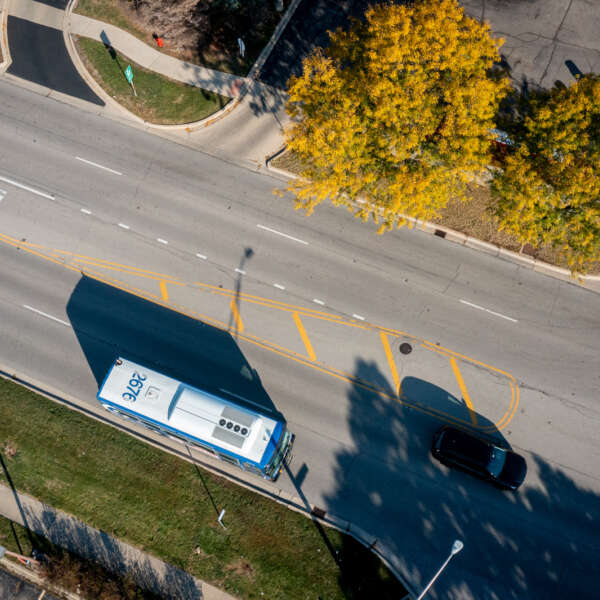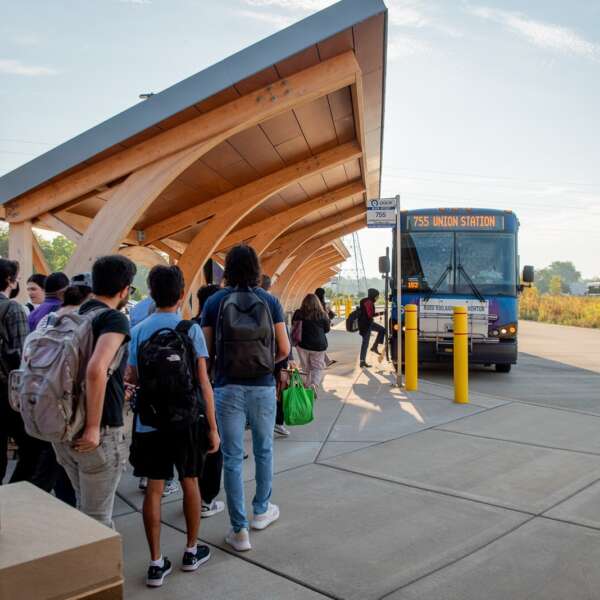Transportation Tuesday recap: Parking mandates and TOD
June 7, 2024
June 7, 2024

Parking dominates metropolitan areas of the United States, in both land area and, often, in policy debates related to land use and development. In 2013, the Chicago Metropolitan Agency for Planning (CMAP) estimated that the Chicago region had over 3.2 million commercial and industrial off-street parking spaces, equal to almost 23 square miles. This supply of parking spaces is largely the result of parking mandates—local land use regulations that require a certain number of parking spaces for new developments. Parking mandates have in turn exerted tremendous influence on land use and transportation patterns.
The second webinar in this year’s Transportation Tuesday series was an open panel discussion and Q&A on the impacts of parking mandates on transit-oriented development (TOD), how they exacerbate issues related to equitable opportunities, and how they contribute to higher costs for new developments.
Moderator Alex Waltz, RTA Principal Planner, Local Planning and Program Management, started the session with an introductory presentation on parking mandates in Chicago by sharing some history of off-street parking and the cost to build lots and garages, noting that in today’s dollars, it costs about $5,500 for a surface parking space and $49,000 for an indoor, underground garage space. Waltz then opened up the discussion by asking the panelists a series of questions.
Beginning on the topic of land use, Jason Wittenberg, Code Development Manager for the City of Minneapolis, said that dedicating a large portion of land to an inactive use like parking reduces residents’ ability to get to all the locations they need to access within a relatively small geographical footprint. Off-street parking increases the space between destinations, making places less walkable and inducing more driving.
Lindsay Bayley, Program Lead for Safe and Complete Streets at the Chicago Metropolitan Agency for Planning (CMAP), shared that most architects start projects by reviewing the parking requirements, and if that requirement is too large or doesn’t fit the desired design, they may be unable to build a profitable development and as a result abandon the project as a whole. This causes a number of negative economic impacts for communities and results in a vacant lot with no sufficient project for residents.
Planning Manager at the City of Evanston Liz Williams added that parking mandates prioritize cars over people, leading to insufficient use of space and a lack of developments for businesses to flourish or people to call home.
Juan Sebastian Arias, Executive Director of Elevated Chicago, included that at a neighborhood scale, parking mandates make an area less walkable and affect the feel of the built environment, creating a disconnect between the sustainability and economic goals of a region.
Further into the discussion, Waltz offered a question to the panelists on how parking mandates may contribute to a lack of “missing middle” housing—or housing that is more dense than single-family homes but less dense than high rises—and asked how these mandates also limit the creation of affordable housing or equitable transit-oriented developments (eTOD).
Liz Williams, Planning Manager for the City of Evanston, noted that parking requirements in Evanston tend to result in less diversity in housing products, with many developments having smaller units that do not align with community members’ preferences for new housing. Bayley added that often, parking mandates restrict housing opportunities for families, especially families looking for apartments with greater than two bedrooms. Because parking spaces are typically included in the rental price of an apartment, parking mandates increase the cost of constructing two and three-bedroom apartments. As a result, new developments tend to be unaffordable for families seeking larger apartments, even if a given family would only use a fraction of the parking spaces provided for their desired unit.
Wittenberg went on to share a successful example of a 12-unit residential building classified as TOD in Minneapolis. Because Minneapolis no longer requires parking minimums, the development was able to use all the lot space for living quarters at a relatively affordable price for new construction, while also encouraging residents to use the nearby public transportation options instead of driving. He added that developers are still in large part proposing residential buildings with some parking despite a minimum not being mandated out of a desire to appeal to buyers, proving that the elimination of parking mandates does not necessarily mean all new residential developments will have no parking.
Arias added that if Chicago had more parking flexibility like Minneapolis, then developers in the city would have an easier time building more diverse housing products, constructing more housing developments near transit, and developing housing that contributes positively to community walkability.
Williams said parking mandates in cities exacerbate car dependency and disincentivize alternative modes of transportation. Bayley piggybacked by stating that parking lots invite drivers to drive to their destination instead of using transit, walking, or biking. With lower or no parking mandates, fewer people would consider driving due to the lack of convenience, ultimately decreasing traffic on the roads and encouraging more people to ride public transit.
The panelists emphasized that it’s important to have a city that offers robust transit and walkability to decrease dependency on cars and the need for parking. With more freedom to use land for essential and equitable developments, regions would see an increase in the overall quality of life.
Transportation Tuesday takes place every Tuesday from May 28 – June 18. The webinars are free, but registration is required. Learn more about future events and register to attend here.
Subscribe to our Newsletter
Related Articles
 Coalition members provide feedback on ‘Transforming Transit,’ RTA’s vision for improved service and accountability
Coalition members provide feedback on ‘Transforming Transit,’ RTA’s vision for improved service and accountability
Nearly 200 riders, advocates, and other stakeholders met virtually with the RTA on February 11 for the sixth quarterly Transit is the Answer Coalition meetin...
February 20, 2025 Far South Halsted Corridor Study prepares for future Pace Pulse service
Far South Halsted Corridor Study prepares for future Pace Pulse service
An RTA Community Planning project kicked off in late 2023 as a crucial step in bringing Pace Pulse service to Chicago’s south suburbs. The Far South Halsted ...
February 19, 2025 RTA proposes reforms to prioritize capital projects, maximizing impact of funding
RTA proposes reforms to prioritize capital projects, maximizing impact of funding
RTA is proposing a historic restructuring of the region’s transit governance to maximize the impact of new operating funding and ensure all riders experience...
February 5, 2025 RTA proposes reforms to integrate fares, require accountability for faster and more reliable transit
RTA proposes reforms to integrate fares, require accountability for faster and more reliable transit
RTA is proposing a historic restructuring of the region’s transit governance to maximize the impact of any new operating funding and ensure all riders experi...
February 5, 2025 For the third year in a row, regional transit ridership was up by double-digits in 2024
For the third year in a row, regional transit ridership was up by double-digits in 2024
Ridership across the Chicago region’s transit system continued to increase throughout 2024, according to the latest data from CTA, Metra, and Pace. The regio...
January 28, 2025 RTA is seeking $1.5 billion in annual operating funding. What would that mean for your commute?
RTA is seeking $1.5 billion in annual operating funding. What would that mean for your commute?
On January 15, RTA released Transforming Transit, a vision for the regional transit system with $1.5 billion in annual operating funding supported by a stron...
January 28, 2025